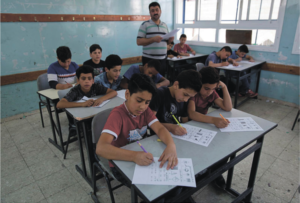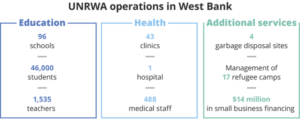Israel’s ban on UNRWA is set to take effect. So what will happen in Gaza, East Jerusalem and the West Bank?

An UNRWA school in the West Bank
Liza Rozovsky, Nir Hasson and Jack Khoury report in Haaretz on 17 January 2025:
The laws passed by Israel against the United Nations Relief and Works Agency for Palestine Refugees (UNRWA) will come into effect in two weeks. Their implementation is expected to halt all UNRWA services in East Jerusalem, and within weeks, an extensive network of schools, clinics, and welfare services in the West Bank is also likely to cease operations.
However, the heaviest toll is anticipated to be borne by hundreds of thousands of Gaza Strip residents who rely on UNRWA for food distribution, medical services, and refugee camps – services that are also expected to collapse.
Consequently, Israel has faced international pressure in recent days to find a solution to the anticipated collapse of UNRWA.
Haaretz has learned that the Israeli Foreign Ministry is negotiating with senior UN officials about transferring UNRWA’s responsibilities to other UN agencies. The possibility of allowing UNRWA to continue its main operations during a transitional phase has not been discussed in these negotiations.
The Israeli defense establishment believes that other UN agencies and aid organizations could fill the void left by UNRWA. However, a European diplomat told Haaretz that while Israel understands that humanitarian aid and healthcare services could be provided by other UN bodies, replacing UNRWA’s shelters for displaced persons in Gaza would be far more challenging.
Despite the strong statements of support for UNRWA from its donor countries and other Western states, the international community recognizes that significant reductions in the agency’s activities are inevitable once the Israeli legislation takes effect.
U.S. pressures for a transitional solution
According to several sources, UN Secretary-General António Guterres has refused any direct discussion with Israel on replacing UNRWA. The U.S., conducting talks with Israel on behalf of the UN, is working on a temporary solution to maintain humanitarian operations in Gaza during the transition period.
At the same time, the Biden administration is pressuring the UN to initiate talks with Israel for an interim solution. Israeli security bodies, including the IDF, the Shin Bet, and the Coordinator of Government Activities in the Territories (COGAT), are well aware of the situation in Gaza and UNRWA’s role, and they are keen to collaborate with the UN to resolve the issue.
One option under discussion between Israel and the U.S. is to allow UNRWA’s Palestinian staff to continue operating under the auspices of another UN body, such as the UN Development Program (UNDP). Under this arrangement, international managers would be replaced, and UNRWA would formally cease its activities, but humanitarian aid would still be provided by the same staff, many of whom Israel claims have ties to Hamas.
Displaced Palestinians receive food aid at the UNRWA center in Rafah, in the southern Gaza Strip, in 2024.Credit: AFP
However, this interim solution does not address Israel’s demand for a thorough purge of UNRWA employees allegedly involved in terrorism. If cooperation with the UN progresses, mechanisms for vetting employees could be established, but the timeline and feasibility of such measures remain uncertain.
A senior Israeli security source stated that other UN agencies are more transparent about their employee rosters, making the proposed solution acceptable to the security establishment.
UN officials note, however, that UNRWA’s mandate does not permit transferring its responsibilities to other bodies. UNRWA officials have expressed willingness to engage in dialogue with Israel, but neither they nor donor countries have been presented with any viable solutions.
West Bank and East Jerusalem challenges

UNRWA services in the West Bank
A senior Palestinian source in the West Bank told Haaretz that transferring UNRWA’s responsibilities to the Palestinian Authority (PA) or the PLO would place an enormous burden on them. Currently, UNRWA operates 43 health centers and 96 schools in the West Bank, serving approximately 47,000 students. The agency also provides welfare services and benefits to around 200,000 residents.
The source noted that the PA lacks a coherent plan to deal with the legislation against UNRWA and its consequences. “We are in a state of learning and waiting, but there is no doubt that the situation is extremely difficult and complex, and we – the Palestinians, the leadership, the factions, and the PA – are paying a heavy price for Hamas’ grave mistake,” he added.
In East Jerusalem, UNRWA’s operations include waste collection, a large employment center, six schools serving 750 students – most from the Shoafat refugee camp –and two clinics in the camp and the Old City.
Municipal officials believe UNRWA schools in the city will continue to operate after the law takes effect, and are preparing to absorb some students into existing municipal schools. Plans to establish a new school near Shoafat using portable classrooms are also being considered, though not within the two-week timeframe. Officials said that the municipality has no list of UNRWA students, making it impossible to contact parents proactively, and that no parents have yet inquired about transferring their children.

UNRWA services in Jerusalem
Gaza faces the worst impact
Gaza residents are expected to bear the brunt of the legislation. UNRWA, Gaza’s second-largest employer after Hamas, previously employed 13,000 staff – mostly teachers. Since the collapse of Gaza’s education system during the war, UNRWA now employs only 5,000 workers, all in humanitarian aid. Other aid organizations in Gaza employ only about 400 workers combined.
While Israeli officials emphasize that UNRWA accounts for only 13 percent of aid entering Gaza, international sources argue that the agency is essential for humanitarian assistance, as other organizations depend on its logistical capabilities. UNRWA also manages shelters for displaced persons, distributes fuel to other aid organizations, and operates food distribution centers and clinics. Moreover, it handles waste collection in shelters for the displaced.
While Israel does not publicly acknowledge its reliance on UNRWA, recent examples illustrate the agency’s importance. For instance, a polio vaccination campaign in Gaza, led by Israel and international organizations, relied on UNRWA to administer 40 percent of the vaccines in clinics and shelters.
An INSS policy paper published two weeks ago emphasized UNRWA’s critical role in providing shelters and monitoring displaced residents’ needs in Gaza. It warned that the current winter poses an even greater challenge than last year, as most residents still depend on UNRWA shelters.
UNRWA’s West Bank director, Roland Friedrich, warned that implementing the legislation could have devastating effects on Palestinians and regional stability. “In Gaza and the West Bank, we provide education to 370,000 children, incorporating tolerance into our programs,” he said. “If this collapses, the risk of radicalization will rise.”
Despite these concerns, a senior Israeli security official noted that if other organizations see that Israel is serious, they will gradually take over UNRWA’s responsibilities. For example, UNOPS has already assumed responsibility for fuel distribution, which is critical for hospitals and bakeries. “Until the war, UNRWA held a monopoly on municipal services in Gaza,” the official explained. “Now, other organizations will take on more responsibility as UNRWA disintegrates.”
The legislation targeting UNRWA was designed to shut down the agency’s operations, based on Israel’s claims that its employees were involved in the October 7 massacre and that Hamas had infiltrated its ranks.
The UN, however, argues that while Israel initially provided evidence linking 19 UNRWA employees to the massacre, Hamas, or other armed groups, it is important to note that the agency employs thousands of staff.
During the summer, Israel’s Foreign Ministry sent a letter to UNRWA Commissioner-General Philippe Lazzarini, listing over 100 employees alleged to be Hamas members, including their purported military identification numbers. In it’s response, UNWRA stated that in order to act upon such allegations “it is critical that UNRWRA receives information and evidence that substantiante’s the goverment’s concerns.” UNWRA claims it never received additional evidence and thus never fired staff from this list.
Israel’s laws against UNRWA were passed by a wide majority, with support from the opposition, but without the backing of Prime Minister Benjamin Netanyahu, who left the Knesset during the vote.
One law bans UNRWA operations in Israel’s sovereign territory, directly affecting East Jerusalem residents. The other prohibits any Israeli authority from maintaining direct or indirect ties with the agency.
As a result, the visas of dozens of international UNRWA employees will expire at the end of the month, barring them from entering Israel, the West Bank, or Gaza.
The laws also prevent the IDF and COGAT from maintaining contact with UNRWA, making it impossible for the organization to coordinate its staff movement at checkpoints, issuing vehicle permits, or allowing the import of supplies for its operations. UNRWA will no longer be able to manage bank accounts in Israel, with Bank Leumi already freezing $3 million in its accounts ahead of the laws taking effect.
UNRWA officials claim the freeze is already disrupting the agency’s operations and that it is unlawful. Under the new restrictions, the organization will be unable to make purchases or pay salaries within Israel. Amid these constraints, the agency anticipates that its activities in the West Bank and Gaza will collapse once the laws take effect.
UNRWA asserts that Israel does not fully grasp the nuanced stance the agency has taken toward Hamas during its years of rule in Gaza. Officials note that UNRWA regularly reported the names of its Gaza employees to Israel and flagged instances where Hamas militants violated the neutrality of its facilities. Two of the agency’s Gaza directors were removed from the territory over the past 15 years due to disagreements with Hamas, emphasized Peter Lerner, who headed the International Organizations Division in Gaza for COGAT until 2007.
The Jerusalem Municipality stated: “Under the guidance of Mayor Moshe Lion, the city’s professional teams supported the legislative process in the Knesset while conducting a review of the services provided by UNRWA to identify high-quality alternatives.”
The municipality added: “As part of this effort, parents were invited to enroll their children in official schools, and the city is prepared to accommodate all UNRWA students in municipal schools. Additionally, the municipality is ready to provide alternative services if necessary, including maternal and child healthcare and sanitation services in the Shoafat refugee camp.”
COGAT has yet to issue a response.
This article is reproduced in its entirety
